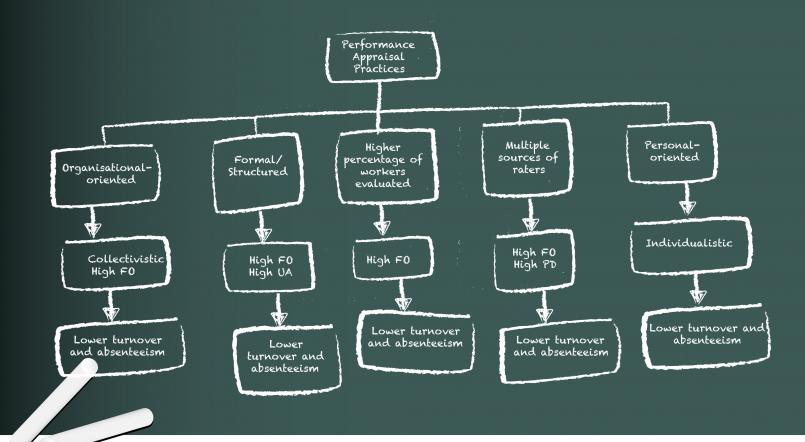Turnover and absenteeism rates remain stubborn problems in many parts of Asia. According to recent studies, in China 71% of surveyed employees called in sick when they were actually well. In India, 54% of workers were reported to be seriously considering leaving their jobs, and this number climbs to 66% for younger employees between the ages of 16 and 24 . In a bid to curtail absenteeism and turnover, companies have sought ways to improve their performance appraisal (PA) systems.
How can this be achieved? Is it better to evaluate a larger proportion of employees within an organisation? Should PA systems be designed for individual-oriented purposes (such as allocating raises or making promotion decisions) or should they be designed for organisation- oriented objectives (like identifying training programs needed for the company). Which works better, informal or formal PA systems?
The answers to these questions seem to down to one’s national culture. Dr Hilla Peretz and Dr Yitzhak Fried (2011), from ORT Braude College of Engineering and Syracuse University, respectively, investigated and uncovered three interesting findings, as outlined here.
1. Future-oriented (FO) cultures: Absenteeism declines when a higher percentage of people are evaluated
In future-oriented cultures, the people live for the future, rather than for today. They are apt to engage in behaviours that would be beneficial to them in the future, such as delaying gratification, advanced planning and goal setting. They also value traits like perseverance and persistence. Examples of such countries are Switzerland and Singapore. On the flipside, those in countries scoring low on future-orientation, like Hungary and Thailand, would prefer addressing their present needs.
This study suggests that in general, companies who evaluate a larger percentage of employees also suffer less absenteeism. What is more striking though is that this relationship is significantly stronger for cultures high in future-orientation. Whilst involving more employees in the PA process absorbs much time, it also provides a greater source of data that could help improve performance in the future.
The performance appraisal
process provides a source of data that could help improve performance in the future.
In collectivistic cultures, individuals in such cultures strongly identify themselves as members of a particular group and highly value in-group loyalty. Here, individuals are expected to place the group’s objectives over their own individual aspirations. Examples of collectivistic cultures include South Korea and Greece. Conversely, individualistic cultures like Sweden and to some extent – Hong Kong - tend to place greater focus on individual rights and opportunities.
This study suggests that companies that emphasise organisational objectives of PA systems also tend to experience lower employee turnover. What is more interesting is that this relationship is especially strong for cultures high in Collectivism. Hence, companies in such countries should emphasise organisational objectives like human-resource planning, identification of training and development needs and the organisation of work.
3. High in uncertainty avoidance (UA): Formal PA systems result in lower absenteeism
Uncertainty avoidance (UA) describes the extent to which people are threatened by uncertain or unpredictable situations. People in high UA cultures (like Denmark and China) appreciate predictability and emphasise the use of social norms, rules, and procedures as a means to minimise uncertainty. In contrast, cultures low in UA (like Hungary and South Korea) tend to be more comfortable with ambiguity and uncertainty.
This study suggests that for cultures high in UA, formal PA systems are associated with lower absenteeism. This makes sense as formal processes like structured evaluation systems can help employees understand exactly what performance dimensions they are being evaluated on. Such certainty is likely to be more appreciated by those high in UA.
In conclusion, MNCs should consider the context of national cultures when designing performance appraisal systems. It is important to ensure that such systems are aligned with the cultural values in these countries. Carefully tailoring performance appraisal systems may help reduce absenteeism and turnover.
This may seem like a time-consuming and complex process. But, we should resist the temptation to adopt a “one-size-fits-all” approach. However, MNCs are already putting in immense effort to understanding and adapting products for clients in different markets. Therefore, shouldn’t they also do the same for their most important resource – their employees?
Methodology
- Data on organisational PA characteristics (percentage of people evaluated, formal structure etc) was collected by Cranfield Network on Comparative Human Resource Management (CRANET) researchers. CRANET is a research collaboration between over 40 universities and business schools globally and has conducted extensive research on human resource best practices and comparative performance within European countries
- The study focused on data from 2004 that consisted of 5,991 (both private and public) organisations from diverse industries like manufacturing and agriculture in 21 (mostly European) countries
- The data on national culture practices (future orientation, uncertainty avoidance, collectivism etc) was based on the 2004 GLOBE database. The sample consists of 62 countries, including those from Asia, Australasia, North and Latin America, Europe, Arabia and Africa
- The percentage of people evaluated refers to the percentage of evaluated employees from the following four occupational groups: managers, technical employees, service or administrative employees, and blue-collar workers
- Organisational-oriented PA refers to the purpose of the evaluation being related to organisational development, like training and development or human resource planning for example
- Organisational-oriented PA refers to the purpose of the evaluation being related to organisational development, like training and development or human resource planning for example
This article was first published in HQ Asia (Print) Issue 04 (2012).


